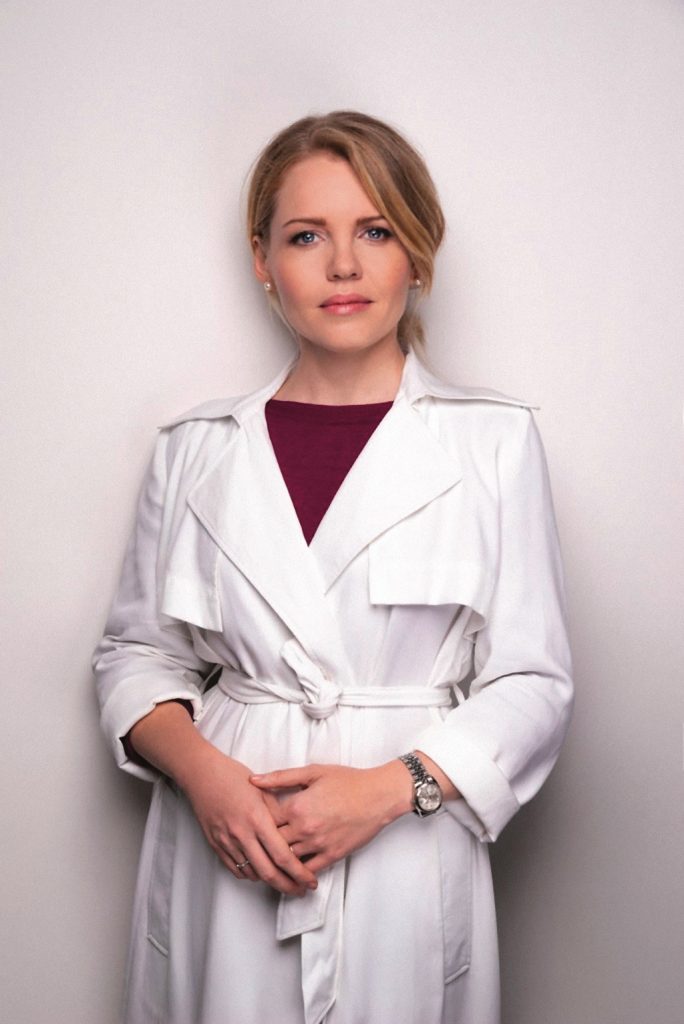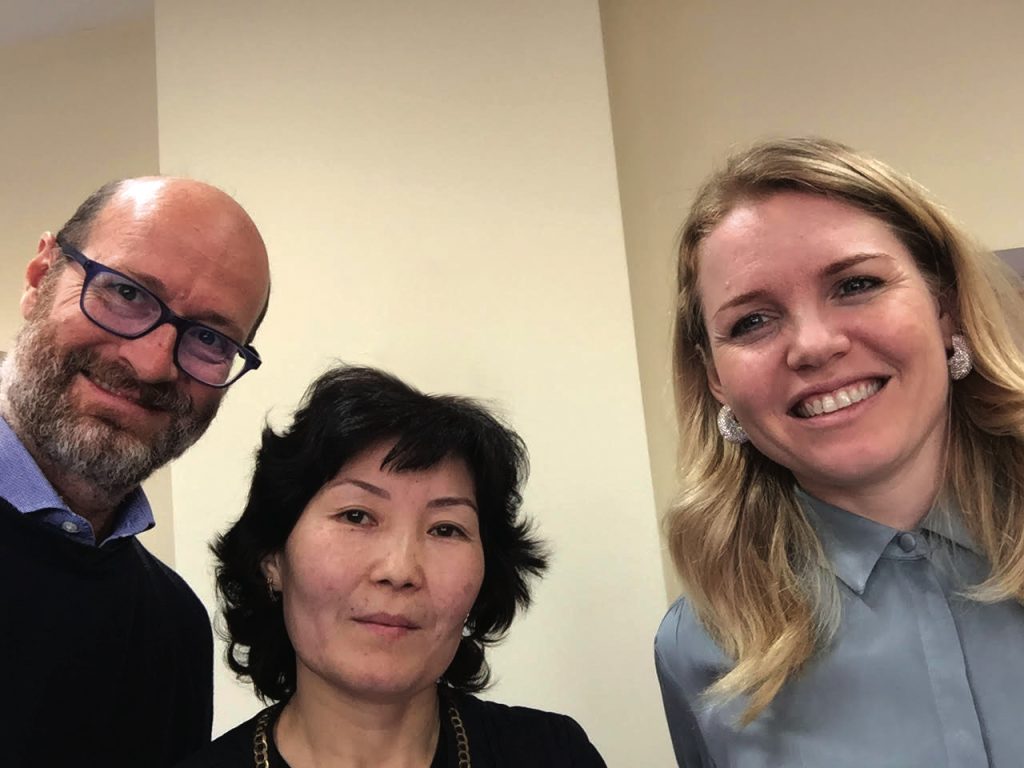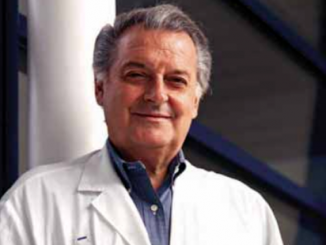A daughter and granddaughter of Russian heads of radiology, now living and working in southern Switzerland, medical oncologist Maria Nazinkina Del Grande is keen to play a part in bringing her two worlds closer together. She’s finding language offers a bridge not just to her native land but to the furthest frontiers of the Russian-speaking world, as Maria Delaney reports.
Career choices are often influenced by family. When the intricacies of medical cases had been poured over on a daily basis at the dinner table, Maria Nazinkina’s decision to study medicine came as little surprise. As a third generation doctor, a legacy hung over her profession, with her achievements often credited to her parents. In order to carve out her own career, after qualifying as a doctor in St Petersburg, she moved to Switzerland, where she now works as a medical oncologist at the Oncology Institute of Southern Switzerland (IOSI), under her married name of Maria Del Grande.
 Del Grande is no stranger to moving. Her family relocated multiple times within Russia during her childhood. She spent the first three years of her life in Novokuznetsk, a Siberian city quite close to the Mongolian border. Her grandmother Zoria L’vovna Brodskaya, herself a leading radiologist, had moved there in 1960 after she’d been advised to leave St Petersburg – more than 4000 km away – because she was Jewish.
Del Grande is no stranger to moving. Her family relocated multiple times within Russia during her childhood. She spent the first three years of her life in Novokuznetsk, a Siberian city quite close to the Mongolian border. Her grandmother Zoria L’vovna Brodskaya, herself a leading radiologist, had moved there in 1960 after she’d been advised to leave St Petersburg – more than 4000 km away – because she was Jewish.
After that came several moves between these two distant cities as Maria’s mother, Iuliia, pursued her own career in radiology, married a fellow radiologist and started a family, eventually settling in St Petersburg, where she is now assistant professor in the radiology department of St Petersburg University, as well as carrying on clinical and research work.
The difference with Maria’s own travel decisions is that she had more of a choice in her destiny. In spite of living abroad, she hasn’t forgotten her roots, and has been developing links with cancer communities in Russia – concentrated in Moscow and St Petersburg – and in Kyrgyzstan – a country geographically much closer to her native city of Novokuznetsk, where Russian is widely spoken. And whether by accident or design, she has also stayed true to the family tradition by marrying leading Swiss radiologist Filippo Del Grande, vice director (medical/scientific) of the recently launched Imaging Institute of Italian Switzerland.
One ambition two realities
Maria Del Grande is positive about the new generation of oncologists in Russia, saying they are very different from the previous generation. Her connection with the NN Petrov National Medical Research Centre of Oncology in St Petersburg involves a mixture of consultations about patients and educational lectures. “They are very motivated and want to achieve the best results that they can,” she says. One reason for this change is that, while the previous generation didn’t lack ambition, they were cut off from the world due to the Cold War. Though this has changed, Del Grande says that many challenges remain, including a lack of mentors and research structure.
According to the latest data from IARC, the WHO International Agency for Research on Cancer, the most frequent cancer types are the same in Russia and Switzerland – breast, prostate, colorectal and lung. However, the mortality rate is greater in Russia for all of these cancers. Overall, the risk of dying from cancer before the age of 75 years is more than 50% higher in Russia (13.5%) than Switzerland (8.8%).
Knowing both healthcare systems as she does, Del Grande says that patients in Russia have a greater mistrust of doctors and don’t go to them with the early warning signs of cancer. The problem is exacerbated by the lack of a proper family doctor structure. When patients do turn to healthcare, they tend to look for many opinions, often delaying treatment still further. It all contributes to more patients presenting with advanced disease, she says. Lack of any structured palliative care service also contributes to a high suicide rate in patients suffering from poorly treated pain and other burdensome symptoms.
Another big difference between the two countries flagged up by Del Grande is the quality of communication between doctors and patients. Communication training is not included as part of post-graduate oncology education in Russia, so when she first began working in Switzerland, she found this aspect a bit of a culture shock – all the more so because she was working in paediatrics, and interacting with parents who were sometimes extremely anxious and would take their child to the emergency department for “simple problems,” she says, worrying, for example, that a cough might be pneumonia.
This wasn’t the only shock for the enthusiastic young doctor, as she discovered that, “even the students knew more than me about the material and how to work with patients.” Determined to succeed, she worked day and night during her first two years abroad, going home for only six hours sleep. “I was only 23. I don’t have that energy now.”
Taking a break from paediatrics for a year between placements to work in internal medicine, Del Grande found what she was looking for. “I remember the first day in internal medicine – I thought: finally I understand everything. I had no problem with the patients, prescriptions or other medical personnel. It was so easy and so comfortable.” Following a rotation in rheumatology in Johns Hopkins Hospital, in Baltimore in the US, Del Grande moved into oncology and is now working in a gynaecological oncology team in IOSI.
As part of this, she runs the multidisciplinary meeting twice a week. She finds this structure and the ease of communication between team members and other colleagues makes solving issues for patients very simple. If she has a query, even with a family doctor, she can pick up the phone and talk to them straight away. It’s a big contrast to Russia, she says, where “there is no approach to cure the patient as a team,” and everybody works alone with no direct communication between oncologists and family doctors.
Balancing clinical and research work
Recently, Del Grande’s family life changed with the birth of her son Alberico. She had to return to work after only four months maternity leave, and initially found it very challenging. “I didn’t expect that it would be so tough for me. I thought I’d be the perfect mother and the perfect professional.” This wasn’t helped by baby Alberico refusing to sleep during the night for the first ten months. Between her added responsibilities as a doctor and newly extended family, she says she now has absolutely no time left for her husband.
She also has almost no time left for her research work, which she says is “on pause”, apart from some small projects as well as her work with the European School of Oncology (ESO). This is because, in Switzerland, there are no protected research hours outside university hospitals. Del Grande feels this affects the careers of mothers in the hospital, as research publications are necessary for promotion, especially to professorship. She points out that there are no mothers at this level in IOSI, and many careers stagnate at lower levels. She would like the hospital to make it easier for women shouldering childcare responsibilities to be able to do research and progress.
She points to examples of systems that are more researcher friendly in other countries where she has worked. In Italy, they used to finish seeing patients at 2.00 pm, while in the UK they saw patients for two full days, with the other days free from clinical work. “I’m very fortunate, as my husband is trying to help organise some free time for me to do some research,” says Del Grande – but she will have to do this research in her free time and not during working hours.
Sharing knowledge
And she has ambitious plans for that free time over the coming two years. She’s currently organising a new project together with the radiology department, researching radiological examination combinations, to find out which are most useful for patients. She has a particular interest in exploring the potential of using muscle composition measured by CT scan as a measurable predictor of response to chemotherapy, progression free survival, and other clinically relevant outcomes in ovarian and breast cancers.
In addition, she is going to be the coordinator for all of the ESO Eurasia projects from 2020. The ESO role builds on work she has already done on a cooperative programme in Kyrgyzstan, supported by ESO and the Swiss Cancer League, which she has coordinated since 2016. Launched by Franco Cavalli, the scientific director of IOSI, and Fedro Peccatori, scientific director of ESO, the SILK project – Setting up digital mammography, breast services Improvements and Learning bridges in Kyrgyzstan – aims to improve breast cancer diagnosis and treatment in this mountainous lower-middle income country, which borders on China to the east, and has Russian as one of its two official languages.
It has already notched up many remarkable achievements, including putting in place a quality-controlled diagnostic system for breast cancer, developing and publishing guidelines adapted to local circumstances and resources, and involving patient advocates. Part of this involved improving the quality of mammography and setting up an immunohistochemistry laboratory that can reliably test tissue samples for ER, PgR, Her-2 and Ki-67 expression. Key elements include a personnel exchange and shared educational programmes between Kyrgyzstan, Switzerland and Italy.
“We involved the whole chain from the patient to government. This is the point”
As Del Grande explains, the lab was set up with funding from the Swiss government, but initially the local medical personnel had neither the knowledge nor skills required to use it. “The most important thing is not equipment, but how to work with this equipment. That’s why ESO was involved: to improve the education.” It’s a common pitfall, she adds, having seen this in Russia, where “they have a lot of machines but they don’t use them, or don’t use them in a proper way.” Similar attention was paid to educating and skilling up radiologists in mammography – work that was led by Chris de Wolf, a Swiss medical expert in breast cancer screening.
To ensure sustainability of the services, Cavalli, Peccatori and de Wolf made extensive efforts to involve doctors, patients, patient organisations and the Government.
Getting the Minister of Health involved is one of Del Grande’s key recommendations when working with middle- or low-income countries. “They are very directorial [in] structure and you will never do anything without the permission of the leaders of the country,” she explains, adding that it’s a lot easier once they are on board. Not only did the Kyrgyz Minister of Health support the programme, but the Government decided to invest in two linear accelerators, which she says is a great improvement, as the country currently has only very old cobalt machines. They also restructured the National Oncological Centre, following visits from programme members and with the help of substantial funding from a Canadian company with local mining interests. “It’s amazing the speed that they did it,” remarks Del Grande.
Patient education was delivered as part of the programme. The project team worked with a local NGO, Ergene, and patient groups, who provide education and support. These groups helped by lobbying for changes in the healthcare system that tied in with the programme. Other keys to success, says Del Grande, include having someone on site for the entire duration of the project who leads everything, “because you can’t do it by yourself, if you don’t move”. Projects like this need timescales of years, not months, she says. Good local media coverage was also important in driving funding and support. “We involved the whole chain from the patient to government. This is the point.”
Addressing language barriers
Having a native speaker on the team is also a plus. “I’m the Russian native speaker, and it is very easy for me to connect with the people locally because we have more or less the same background.” Some doctors in Kyrgyzstan are learning English now, enabling them to create a direct connection between specialities there and in Europe, pathologist to pathologist for instance, without having to have Del Grande in the middle. This was not previously possible.
Language is also a problem in Russia, where Del Grande says the majority of doctors don’t speak English. In hospitals she has worked with, she says only about 10–15% of doctors speak the language well. There’s an absolute lack of language education, she adds, as in university they don’t read medical information in English, but have it translated into Russian.
“I find that makes no sense. You have to push the person to learn the language and open their mind.” This lack of language skills creates an unhelpful reliance on the few who are confident in English to act as liaisons between colleagues in Russia and other countries. Del Grande says this also has an impact on research, as medical knowledge is not easily accessible. “You shouldn’t reinvent the bicycle,” she comments.
Coming from a similar background and sharing a language means Del Grande can play a pivotal role in promoting e orts by the European School of Oncology (ESO), and others, to work with the cancer community in Kyrgyzstan. She is pictured here with a patient and with ESO’s Scienti c Director, Fedro Peccatori, at one of the breast cancer consultations they attended during their most recent visit to the National Centre of Oncology and Haematology in Bishkek, Kyrgyzstan, as part of the SILK project to improve breast cancer diagnosis and treatment in the country.
Her Russian accent when speaking Italian in her adopted home region of southern Switzerland has the locals confused – most patients assume she’s from the German part of the country, she says. She’s much happier about her communication with patients than when she first arrived, and has grown used to Swiss culture. “We understand each other very well and they’re happy to be [treated] by me.” Being useful, she feels, is “the most beautiful thing” about working in oncology.
Looking ahead, she is optimistic about the progress that genetics and precision medicine can achieve, and remarks that, when she was away from clinic recently for a year, on her return she found that the first line of treatment had changed in every field. “I saw the patients that were treated differently, how they changed.”
As for her links with Russia, she wants to achieve more results there with not only the ESO Eurasia Masterclasses in Clinical Oncology, but also on-site visits, with reviews and audits. She wants to create centres of excellence that will “have the opportunity to educate other doctors, and show others how they can improve their work”. It’s all spurred on by her desire “to give back something valid to my country” – an ambition she will pursue with the ESO Eurasia projects in the coming year.





Leave a Reply